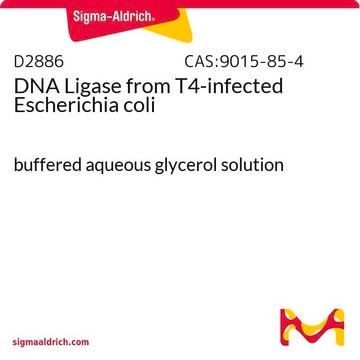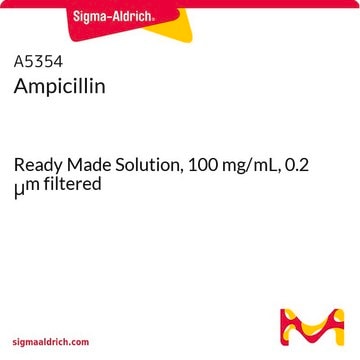LIG2
QuickLink™ DNA Ligation Kit
joins blunt-end and sticky-end DNA fragments
Sinónimos:
DNA Ligation Kit, Ligation Kit
About This Item
Productos recomendados
grade
for molecular biology
Quality Level
form
liquid
usage
kit sufficient for 50 ligation reactions
technique(s)
molecular cloning: suitable
shipped in
dry ice
storage temp.
−70°C
General description
Application
- Joining blunt or cohesive-end fragments of DNA into a cloning vector
- Recircularization of linear DNA
- Formation of concatamers
- dsDNA nick repair
Features and Benefits
- Fast 5 minutes ligation
- High ligation efficiency
- Room temperature reactions – no cooling required
- Perform bacterial transformation with the reaction mixture
Components
- 500uL 2X Ligation Buffer A (L9537)
- 100uL 5X Ligation Buffer B (L9662)
- 250 units T4 DNA Ligase (D2886) in 50% glycerol with 10 mM Tris-HCl (pH 7.5) 50 mM KCl, and 1 mM DTT
Principle
Legal Information
related product
Storage Class
10 - Combustible liquids
flash_point_f
Not applicable
flash_point_c
Not applicable
Certificados de análisis (COA)
Busque Certificados de análisis (COA) introduciendo el número de lote del producto. Los números de lote se encuentran en la etiqueta del producto después de las palabras «Lot» o «Batch»
¿Ya tiene este producto?
Encuentre la documentación para los productos que ha comprado recientemente en la Biblioteca de documentos.
Protocolos
T4 DNA ligase is used for the joining of DNA molecules with compatible cohesive (sticky) termini, joining of blunt ended double stranded DNA molecules
Nuestro equipo de científicos tiene experiencia en todas las áreas de investigación: Ciencias de la vida, Ciencia de los materiales, Síntesis química, Cromatografía, Analítica y muchas otras.
Póngase en contacto con el Servicio técnico








